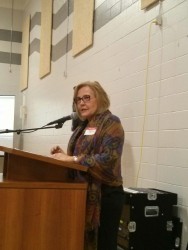Article Origin
Volume
Issue
Year
One of Canada’s Truth and Reconciliation commissioners “feels expectant” that the election of a Liberal government in Ottawa will “give birth to new life” in the relationship between government and First Nations.
Dr. Marie Wilson, speaking at Aamjiwnaang in Sarnia, Ont., Oct. 20 , said Prime Minister-designate Justin Trudeau said “very important things” in his election-night speech about dealing with Aboriginal people on a “nation-to-nation” basis. “We will need to hold him to account” for what he has promised, she told around 300 people at a meeting in the band’s community centre. One concrete pledge Trudeau made during the campaign was an increase of $2.6 billion for First Nations education.
Trudeau has also promised to implement all 94 of the TRC’s Calls to Action from its report on residential schools, including the creation of an inquiry into murdered or missing Indigenous women, she said.
The commissioners are hoping to arrange a meeting with the Prime Minister-elect soon, Wilson said in an interview.
She hopes Trudeau will pay special attention to another recommendation that calls on the government to create a National Council for Reconciliation. The council would make an annual report on whether the gap in quality of life between Indigenous and non-Indigenous Canadians is improving. Wilson called on the audience to ask their MPs to support creation of this body.
First Nations people and Canadians are “the real two solitudes”, and the two can no longer afford to be strangers, Wilson told the crowd of both Aamjiwnaang and Sarnia city residents. Canadians need to make events like the Sarnia meeting, bringing Indigenous and non-Native people together “an ordinary thing,” she said.
During six years as commissioner, Wilson said she has learned that most Canadians have a “genuine desire” to set a new course in relations, and most Indigenous people want to believe the rest of Canada is listening to their concerns and wants to help.
Education is key to helping reconciliation for future generations, Wilson told the meeting, partly sponsored by the United Church of Canada. Growing up in the small town of Petrolia, near Sarnia, Wilson remembers putting pennies in the collection plate at Sunday school ‘for the Indian children up north.”
“Never did it occur to me,” she remembers, “that they weren’t with their own families in their own homes.” The story of Indian residential schools needs to be taught in all Canadian schools from now on, she said. “This is Canadian history, not just Aboriginal history,” Wilson added.
Residential school survivors have shown “a huge capacity for resiliency,” she told the group. “It’s nothing short of miraculous” that some could speak about their experiences at the schools.
Reconciliation will take time, she cautioned the audience. “We’re in for the long haul, but all Canadians will benefit” in the long run, Wilson said.
The Commission still has work to do before its mandate expires at the end of December, including the establishment of a National Centre for Truth and Reconciliation at the University of Manitoba, with on-line portals at other Canadian campuses, allowing students and scholars access to original documentation about residential schools, Wilson told the audience.
- 2285 views

